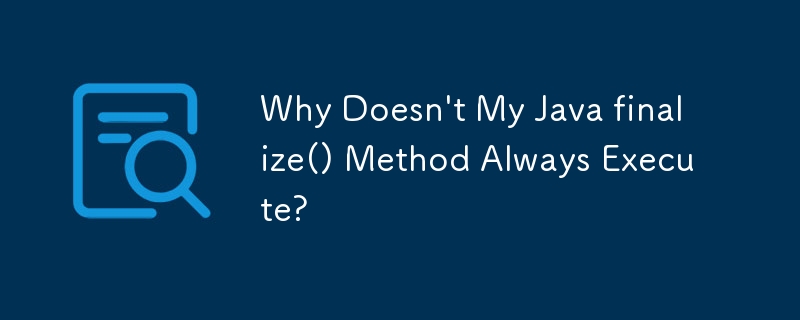

Understanding the Invocation of finalize() Method in Java
The finalize() method is a crucial aspect of Java's memory management, playing a role in the garbage collection process. When an object becomes eligible for garbage collection, Java runs the finalize() method as part of the process. However, some developers encounter instances where the finalize() method appears to be not executing in their tests.
In these cases, the reason lies in the nature of garbage collection. The JVM does not guarantee that garbage collection will occur at a specific time. Even if an object qualifies for garbage collection, it's possible that the JVM will not execute finalize() immediately.
Moreover, it's important to recognize that an object may never get garbage collected. This can occur when the object remains reachable throughout the JVM's lifetime or when no garbage collection process runs before the JVM terminates.
While there are techniques to force the JVM to execute finalize(), these approaches are generally discouraged. Relying on finalize() for essential functionality is not advisable. Its purpose is solely to perform cleanup tasks, particularly for non-Java resources, due to its unreliable behavior. By understanding these concepts, developers can avoid potential misunderstandings and use finalize() method effectively.
The above is the detailed content of Why Doesn't My Java finalize() Method Always Execute?. For more information, please follow other related articles on the PHP Chinese website!
 what python can do
what python can do
 What is the reason for failure to connect to the server?
What is the reason for failure to connect to the server?
 Usage of Type keyword in Go
Usage of Type keyword in Go
 Which key should I press to recover when I can't type on my computer keyboard?
Which key should I press to recover when I can't type on my computer keyboard?
 Introduction to dex concept digital currency
Introduction to dex concept digital currency
 Detailed explanation of linux dd command
Detailed explanation of linux dd command
 getelementbyid
getelementbyid
 iPhone 16 expected launch time
iPhone 16 expected launch time




